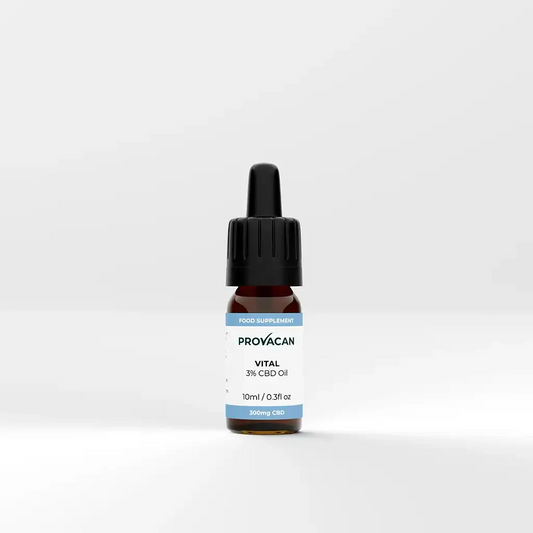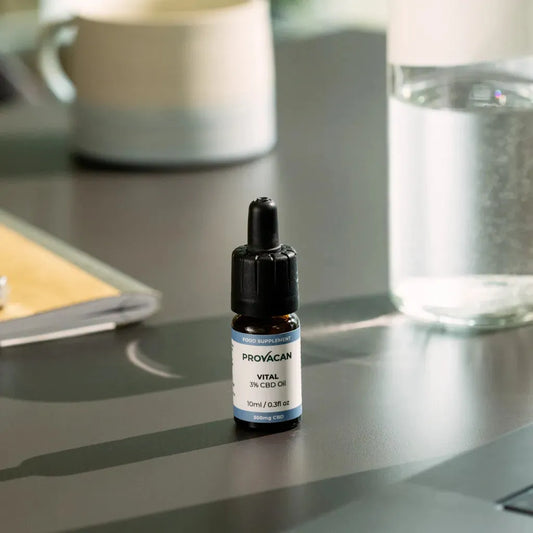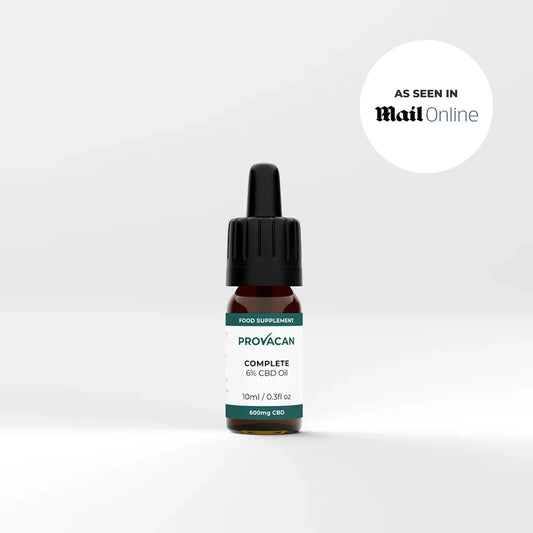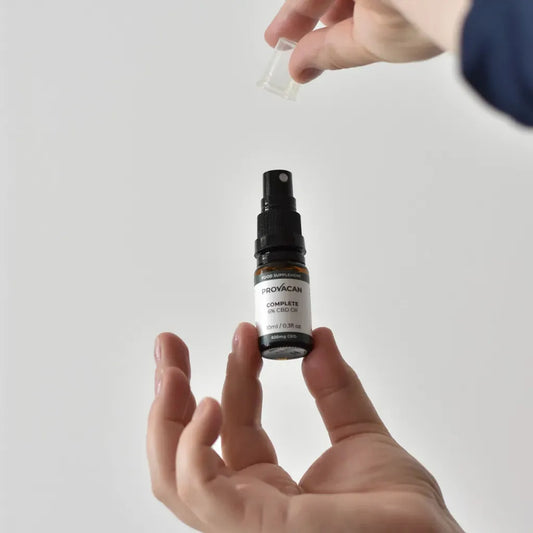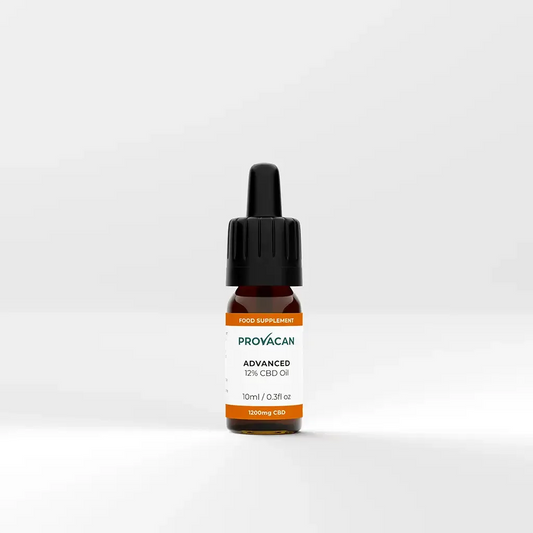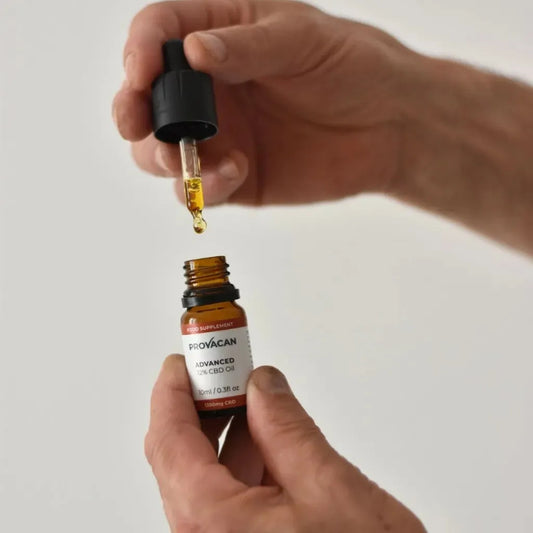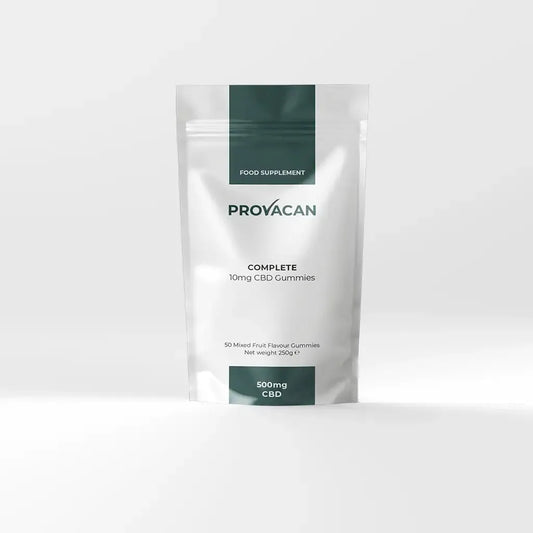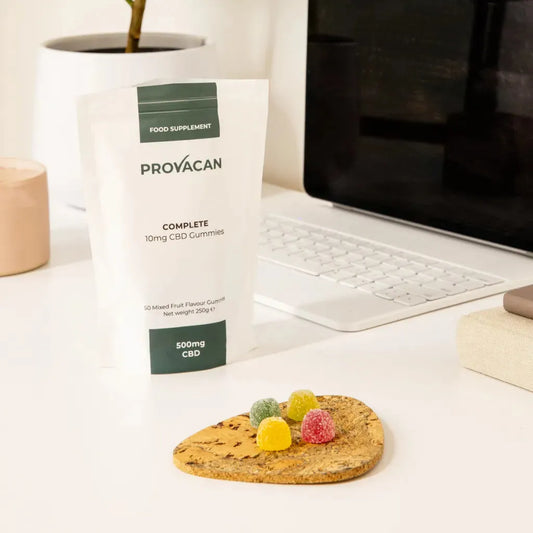Key Takeaways:
- CBD vs. THC: Understand why CBD doesn't cause a high, unlike its psychoactive counterpart, THC.
- Health Benefits Without the High: Learn how CBD can offer therapeutic benefits while keeping you clear-headed.
- Product Selection: Get tips on choosing the right CBD product for your needs without worrying about intoxication.
As a leading provider in the CBD industry, Provacan stands at the forefront of quality and innovation, trusted by thousands for delivering some of the most effective CBD products on the market. Our commitment to scientific rigor and product transparency ensures that every item we offer is of the highest standard.
CBD has rapidly gained popularity as a natural remedy for various health concerns, but a common question persists: does CBD make you high? This question stems from CBD’s association with cannabis, a plant often linked to psychoactive effects.
In this piece, we will explore whether CBD can make you high, explaining how it interacts with the body and why it differs from other cannabis compounds.
Understanding The Psychoactive Effects Of Cannabis
Cannabis is a plant that contains numerous compounds, including cannabinoids, terpenes, and flavonoids. Among these, the cannabinoids THC and CBD are the most widely recognised. THC is the primary psychoactive component of cannabis, responsible for the euphoric sensations often referred to as a “high.” When THC interacts with the brain’s cannabinoid receptors, it alters perception, mood, and cognition, leading to the characteristic effects associated with marijuana use.
On the other hand, not all cannabis compounds induce psychoactive effects. This distinction is crucial when discussing CBD, as its interaction with the brain and body differs significantly from that of THC. Understanding these differences is key to answering whether CBD can make you high.
How CBD Interacts With The Body
CBD, or cannabidiol, has gained significant attention for its potential therapeutic effects without the psychoactive impact associated with THC. One of the key reasons for this distinction lies in how CBD interacts with the body, particularly through the endocannabinoid system (ECS). The ECS is a vital biological system that helps regulate a range of physiological functions, and CBD’s unique interaction with this system underpins many of its proposed health benefits. Understanding how CBD works within the body reveals its potential and distinguishes it from other cannabinoids like THC.
The Endocannabinoid System: A Key Player In Homeostasis
The endocannabinoid system (ECS) is a complex network of receptors, enzymes, and endogenous cannabinoids (endocannabinoids) that play a pivotal role in maintaining the body's homeostasis. This system is involved in regulating a variety of physiological processes, including pain, mood, appetite, immune response, and more. The ECS consists primarily of two types of receptors: CB1 receptors, predominantly found in the brain and central nervous system, and CB2 receptors, mainly located in the peripheral organs and immune cells. The ECS is essential for ensuring the body’s internal environment remains stable, adapting to external changes and stressors.
CBD’s Indirect Interaction With CB1 Receptors
Unlike THC, which binds directly to CB1 receptors in the brain to produce its psychoactive effects, CBD interacts with these receptors in a more indirect manner. CBD does not have a strong affinity for CB1 receptors and does not bind to them in the same way as THC. Instead, CBD modulates the receptor’s ability to interact with other cannabinoids, including the body’s own naturally occurring endocannabinoids. By influencing the way CB1 receptors respond, CBD can help regulate the effects of these endocannabinoids, which may contribute to its potential in managing conditions like anxiety, pain, and epilepsy without inducing a "high."
CBD’s Influence On Other Receptors
In addition to its interaction with the endocannabinoid system, CBD also affects other types of receptors in the body, contributing to its wide-ranging therapeutic potential. For instance, CBD interacts with serotonin receptors, particularly the 5-HT1A receptor, which plays a significant role in mood regulation and anxiety. This interaction is one of the reasons CBD is thought to have anxiolytic (anxiety-reducing) effects. Moreover, CBD influences TRPV1 receptors, also known as vanilloid receptors, which are involved in regulating pain and inflammation. This multi-receptor activity helps explain why CBD is being explored as a treatment for a variety of conditions beyond those typically associated with the ECS.
Therapeutic Implications Of CBD’s Mechanism Of Action
The way CBD interacts with the body suggests a broad range of potential therapeutic applications. By modulating the ECS and influencing other critical receptors, CBD has shown promise in the treatment of conditions such as chronic pain, anxiety disorders, epilepsy, and inflammation. The fact that CBD does not produce psychoactive effects like THC makes it an attractive option for those seeking relief from symptoms without the altered mental state associated with cannabis use. As research continues, the understanding of CBD’s mechanisms may lead to more targeted therapies and an expanded use of this compound in both clinical and wellness settings.
CBD vs. THC: Why Only One Gets You High
CBD and THC are both cannabinoids derived from the cannabis plant, but they have very different effects on the body and mind. The primary reason THC gets you high while CBD does not lies in their interaction with the brain's cannabinoid receptors.
THC binds directly to the CB1 receptors in the brain, particularly in areas associated with memory, pleasure, and time perception. This binding is what triggers the psychoactive effects, leading to the sensation of being high.
In contrast, CBD has a much lower affinity for CB1 receptors and does not bind to them in the same way. Instead, it acts as a modulator, potentially even counteracting the effects of THC when both are present. This means that while THC directly influences the brain to create a high, CBD works in a way that does not produce these mind-altering effects.
Can CBD Make You High?
The short answer is no, CBD does not make you high. Unlike THC, CBD does not have psychoactive properties that alter your state of mind or create euphoria. Even at high doses, CBD is not known to cause intoxication or impairment.
This is because CBD’s interaction with the endocannabinoid system is fundamentally different from that of THC. While THC directly activates the CB1 receptors in the brain, leading to a high, CBD acts more as a regulator, modulating the activity of these receptors without directly stimulating them. In fact, some studies suggest that CBD can actually mitigate the psychoactive effects of THC when the two are used together.
This makes CBD a popular choice for those seeking the therapeutic benefits of cannabis without the mind-altering effects associated with marijuana use.
The Benefits Of CBD Without The High
CBD (cannabidiol) is widely valued for offering numerous health benefits without the psychoactive effects of THC (tetrahydrocannabinol). Its appeal lies in the potential ability to relieve various physical and mental health issues while allowing users to stay clear-headed and functional, making it a versatile option for many.
Anxiety And Stress Relief Without Cognitive Impairment
CBD could help manage anxiety and stress without affecting cognitive function. Research suggests it may interact with serotonin receptors, which could help manage everyday stress and promote calmness, making it suitable for daytime use, work, or social situations where mental clarity is essential.
Pain Relief And Inflammation Reduction Without Euphoria
CBD is popular for its potential to support discomfort and inflammation without the euphoric effects of THC. By interacting with the endocannabinoid system, CBD may help promote a balanced response to physical challenges, offering a natural alternative for those needing relief without impairment, allowing them to maintain their daily routines.
Sleep Support Without Next-Day Grogginess
CBD is often explored for its potential to promote better sleep without the grogginess often associated with other sleep aids. It may have calming effects to help users fall and stay asleep naturally, enabling them to wake up refreshed and ready for the day, unlike THC, which can disrupt the sleep cycle.
Neuroprotective Benefits Without Psychoactive Effects
CBD has been studied for its potential in supporting neurological health, particularly in conditions like epilepsy and multiple sclerosis. Research suggests it may help protect neurons and reduce seizure activity, and unlike THC, it does not have psychoactive effects.
Ideal For Daily Use In Various Settings
Because CBD does not impair cognitive or motor functions, it is suitable for daily use in various settings, including work, social events, and driving. This makes it an appealing option for those seeking support with inflammation, discomfort or sleep disorders throughout the day without disruption.
How To Choose The Right CBD Product
With the growing popularity of CBD, the market is flooded with a wide variety of products, including oils, tinctures, gummies, capsules, and topical creams. Choosing the right CBD product depends on your specific needs, preferences, and the results you wish to achieve.
When selecting a CBD product, it’s important to consider the following factors:
- Type of CBD: There are three main types of CBD products: full-spectrum, broad-spectrum, and CBD isolate. Full-spectrum contains all the cannabinoids found in the cannabis plant, including trace amounts of THC, which may enhance the therapeutic effects through the entourage effect. Broad-spectrum also contains multiple cannabinoids but without THC. CBD isolate is pure CBD with no other cannabinoids.
- Dosage and Concentration: The dosage of CBD can vary significantly between products, so it’s essential to start with a low dose and gradually increase until you find the right amount for your needs. The concentration of CBD in the product is also crucial; higher concentrations may be more effective for severe symptoms, while lower doses might be sufficient for milder conditions.
- Method of Consumption: The method by which you take CBD affects how quickly and efficiently it works. For instance, CBD oils and tinctures, taken sublingually, offer faster absorption, while gummies provide longer-lasting effects but take longer to kick in. Topical applications are ideal for localised relief, such as for muscle pain or skin conditions.
- Quality and Purity: Always choose products from reputable brands that provide third-party lab testing results to ensure the CBD is free from contaminants and contains the advertised amount of CBD.
By carefully considering these factors, you can select a CBD product that best suits your needs, ensuring that you enjoy the benefits of CBD without any unwanted side effects.
Final Thoughts
CBD is a versatile compound that offers numerous potential health benefits without the risk of getting high. Unlike THC, CBD does not have psychoactive properties, making it an appealing option for those looking to manage symptoms like anxiety, pain, or inflammation without altering their mental state. Understanding the differences between CBD and THC is crucial for anyone considering CBD as part of their wellness routine.
Whether you're new to CBD or have been using it for some time, it's important to choose the right product that suits your needs and preferences. By doing so, you can fully experience the therapeutic potential of CBD while remaining clear-headed and in control.
As CBD continues to grow in popularity, ongoing research will likely uncover even more about its benefits and uses, further solidifying its place in the wellness industry.
Read also:
Frequently Asked Questions About CBD And Whether It Can Make You High
Can CBD make you feel euphoric?
No, CBD does not cause euphoria or any form of intoxication. It lacks the psychoactive properties found in THC, which is responsible for the "high" associated with cannabis.
Is there any chance of getting high from full-spectrum CBD?
Full-spectrum CBD contains trace amounts of THC (less than 0.2%), but this amount is too low to cause a high when taken in recommended doses.
Can taking too much CBD cause a high?
Even at high doses, CBD does not cause a high. Overconsumption of CBD may lead to side effects like drowsiness or nausea but not intoxication.
Does CBD affect your mental clarity?
No, CBD is non-psychoactive and is generally not associated with impairing mental clarity or cognitive function. Many people use it without concerns about altering their state of mind.
Is it safe to drive after taking CBD?
Yes, since CBD does not induce a high or impair cognitive functions, it is generally safe to drive after taking it. However, it’s always best to see how your body reacts first.
Can CBD show up on a drug test?
CBD itself should not cause you to fail a drug test. However, full-spectrum CBD products contain trace amounts of THC, which could potentially lead to a positive result.
How does CBD compare to THC in terms of effects?
While THC causes psychoactive effects, CBD does not. CBD offers therapeutic benefits such as anxiety relief and pain management without the mind-altering effects of THC.
Is it possible for CBD to counteract the high from THC?
Yes, CBD can modulate the effects of THC, potentially reducing the intensity of a THC-induced high by interacting with the same receptors in the brain.
Are there any CBD products that can cause a high?
No, CBD products, when properly labeled and free of excessive THC, should not cause a high. Always check product labels to ensure they comply with legal THC limits.
Sources:
- LDN, G. (n.d.). HOW DOES CBD SHOW UP IN A DRUG TEST? GLOWBAR LDN. https://glowbarldn.com/blogs/cbd-guides/does-show-drug-test
- Swan, D. (2022, May 19). Everything You Need to Know About CBD: Facts, FAQs, and Products. Zen Leaf Dispensaries. https://zenleafdispensaries.com/blog/complete-cbd-guide/
- White, C. M. (2019). A Review of Human Studies Assessing Cannabidiol’s (CBD) Therapeutic Actions and Potential. The Journal of Clinical Pharmacology, 59(7), 923–934. https://doi.org/10.1002/jcph.1387




